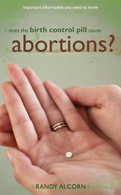Answer by William Toffler, MD (member of Focus on the Family Physicians Resource Council)
There is (at least in my mind and many others) an inconsistency in our position statement. I believe that there is considerable evidence that so-called birth control pills (BCPs) do have a significant post-ovulatory (abortifacient) effect. For example, women generally have lighter periods on the pill. The lining of the womb can thin to less than 7mm (the minimum that infertility doctors believe is optimal for successful implantation). In fact, as you know, BCPs can be used to treat dysfunctional uterine bleeding by causing a hypertrophic endometrium to become thinner over several cycles.
Furthermore, as is noted on Randy Alcorn’s EPM website, there are at least four peer-reviewed articles that document a higher ectopic rate for women on the pill—ranging from an increase of 70% to more than 1000%. The only explanation possible for this phenomenon is that some of the pregnancies that would have occurred in the womb did not (just like the ectopic rate for IUDs is higher).
While we struggled unsuccessfully for more than two years to come to consensus about BCPs, a subsequent discussion on the so-called emergency contraception (EC) took less than two hours. Remarkably, we came to consensus relatively quickly that the EC would act as an abortifacient in some women depending on the timing of intercourse relative to her cycle (and the timing of her use of EC). Even though he fully concurred with the consensus conclusion about EC, I remember one of my colleagues stating privately that there is less evidence for the abortifacient properties of EC than there is for the abortifacient property of so-called birth control pills.
So what happened? How does one explain the differing response to BCP vs. EC? The only explanation that I can offer is by reflecting on my own experience. While I only recall one occasion where I prescribed EC, I used to prescribe BCPs heavily and was enmeshed in the contraceptive paradigm. When I started to recognize my own inconsistency and considered changing, I became fearful. Even if I didn’t use them with my wife anymore, how could I reject contraception as an option for my patients? How could I continue to practice as a family physician? Could I do OB? Women’s Health? Could I continue to teach at a university? What would my colleagues say? What about residents? Students? Could I keep my job? Could I make even make a living in medicine? These weren’t trivial questions—at the time, I had seven children at home.
In retrospect, needless to say, I shouldn’t have worried. God rewards abundantly even a small step in faith. He certainly has me. I am freed of my own inconsistency (hypocrisy?) and my life and practice has never been richer (both literally and figuratively).
Many of my colleagues are even more enmeshed in the contraceptive paradigm than was I. Can you imagine how difficult it must be for an OB-Gyn whose whole practice is built on this paradigm. Perhaps they are near the end of their career; consider what feelings they might have if they were to acknowledge (even privately) that they have been indirectly contributing (at least in some cycles in some women) to a chemical assault and destruction of some unborn?
 Perhaps I am mistaken, but I believe it is easier to have a detached, scientific discussion and reach consensus about the abortifacient properties of BCPs and EC with a pro-abortion doctor than a prolife doctor—at least one who is already enmeshed in prescribing. You see, a pro-abortion person will often look at the evidence and say, "Ok, so the evidence suggest that the mechanism of action of EC or even BCP may result in an early abortion, so what?" On the other hand, some senior OB-Gyns who consider themselves strongly prolife are adamant that BCPs have no abortifacient action. While no prolife doctor would knowingly do something to cause the destruction of human life, can you imagine how difficult it is for physicians to open ourselves up to the reality that, at least in some aspect of our practice, we may actually be doing just that.
Perhaps I am mistaken, but I believe it is easier to have a detached, scientific discussion and reach consensus about the abortifacient properties of BCPs and EC with a pro-abortion doctor than a prolife doctor—at least one who is already enmeshed in prescribing. You see, a pro-abortion person will often look at the evidence and say, "Ok, so the evidence suggest that the mechanism of action of EC or even BCP may result in an early abortion, so what?" On the other hand, some senior OB-Gyns who consider themselves strongly prolife are adamant that BCPs have no abortifacient action. While no prolife doctor would knowingly do something to cause the destruction of human life, can you imagine how difficult it is for physicians to open ourselves up to the reality that, at least in some aspect of our practice, we may actually be doing just that.
The good news is that our discussions have led to a better statement. Thus I celebrate the fact that we have made some progress. None of us insert IUDs. Four or five years ago, this wasn’t true. At least one staff member who attended our meetings told me privately that she had never known about the mechanism of action of the IUD until we had taken up the debate about BCPs (she subsequently had it removed). I don’t think that any of us prescribe the so-called mini-pill (progesterone only) because of the high likelihood of breakthrough ovulation and a post-ovulation effect in interrupting a conception. Finally, I am not sure we would have had such quick consensus on EC had we not had the years of discussion and (sometimes animated) debate on BCPs.
For more information on this subject, see Randy Alcorn's book Does the Birth Control Pill Cause Abortions?



